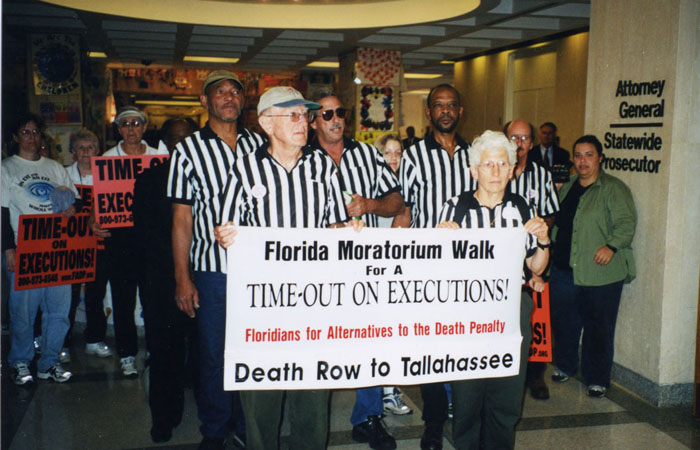Collections : [National Death Penalty Archive]
National Death Penalty Archive
Researchers, writers, activists, and records on capital punishment in the United States.
Search Constraints
Start Over You searched for: Collecting Area National Death Penalty Archive Remove constraint Collecting Area: National Death Penalty Archive Date range 1993 Remove constraint Date range: <span class="single" data-blrl-single="1993">1993</span>Search Results
Communications, 1983-2013 2.6 cubic ft.
The communications series encompasses mailings, newsletters, and events that Mr. Bonowitz participated in.
Administration, 1988-2008 1.0 cubic ft.
This series consists of administrative materials of Virginians for Alternatives to the Death Penalty including meeting minutes, calendars, and notes.
Administrative Files, 1977-2005, Undated 1.9 cubic ft.
Series 1 contains documents relating to the internal procedures and finances of Murder Victims' Families for reconciliation. While there are a few documents that provide evidence of how the organization was set up, the majority of documents focus on hiring, day to day finances, and committee meetings. There are also materials related to strategic planning and the creation of by-laws and organizational procedure. Although the series contains materials from 1977 to 2005, the bulk of the material is from 1996 to 2004. Contained in this series are meeting agendas, meeting minutes, meeting summaries, correspondence, annual reports, ballots, evaluation forms, applications, newsletters, fliers, budgets, financial reports, manuals, by-laws, pamphlets, drafts, notes, reports, contracts, forms, resumes, proofs, floppy disks, and cassettes.
David Von Drehle Papers, 1897-2003 7.5 cubic ft.
Alvin Ford Papers, 1965-1995 5.4 cubic ft.
Defense Team Research Material, 1972-1995 1.26 cubic ft.
This series contains the research material that Ford's defense team accumulated over the course of their representation of Ford and includes research material from years prior to and after the case. This series contains notes on cases in progress as well as some material from related cases. There are newsletters, briefings, pamphlets, bulletins, essays, reports, and publications which discuss anti-death penalty and related legal issues. Also included are photocopies of selections from various undated publications about the death penalty. This series represents literature from a wide spectrum of death penalty abolitionists. Several folders contain news clippings organized by year that give a good overview of related death penalty cases and issues. Many of the news clippings were photocopied before deposit in the Department of Special Collections and Archives, while others required preservation photocopying. Also of note are several papers on death penalty issues written by professors and others representing law schools and universities in the United States.
Steven King Ainsworth Papers, 1993-2018 .33 cubic ft.
Bill Babbitt Collection, 1967-2016 4.82 cubic ft.
Legal Materials, 1991-1999 1.82 cubic ft.
The majority of this series consists of court records from Manny Babbitt's case. There are materials from the District Court for the Eastern District of California, Court of Appeals for the Ninth Circuit, California Supreme Court, and U.S. Supreme Court. The series also contains other legal documents, such as Manny Babbitt's last will and testament, and legal correspondence.
Bill Pelke Papers, 1965-2007, Undated 18.32 cubic feet
Correspondence, 1967-1999, Undated 1.6 cubic feet
This series contains the correspondence directed to Bill Pelke, as well as a small amount of correspondence from Bill Pelke. This includes correspondence from death row inmates and fellow activists. Correspondence from activist groups is included in the Activism series; however researchers should note that because of the nature of activist groups, one individual may be involved in many groups. In the event of one individual with correspondence from many groups the correspondence has been assembled together under the activists name.
Biographical, 1950-1998 0.17 cubic ft.
This series contains two large bibliographies of Ernest van den Haag's writings. The first bibliography covers his works from 1950-1982. The second includes his writings up to 1998. These bibliographies organize his writings alphabetically by topic and each publication includes an assigned number. These numbers do not reflect a strict, but rather general chronological order (i.e. number one was published in 1968 while number two was published in 1954). The numbering system probably reflects the order in which the articles were begun. Some were published quickly while others took longer. This series also contains van den Haag's curriculum vitae from 1973-1998 as well as short biographies from 1973-1989.
